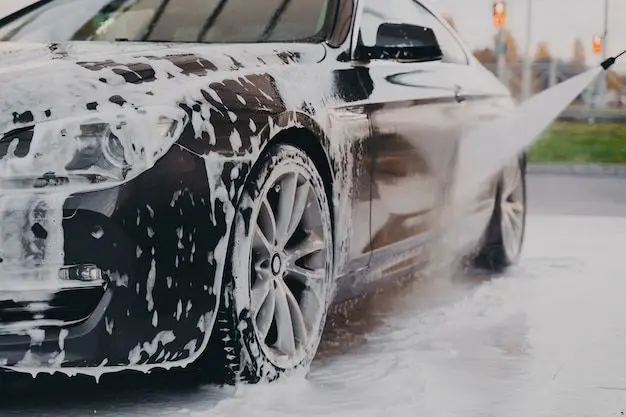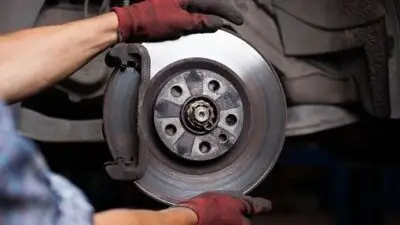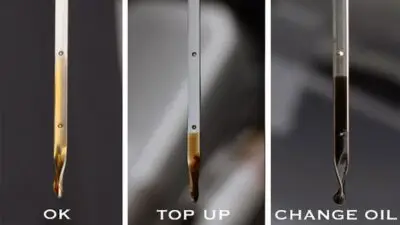You might think car washing is just about keeping your vehicle looking nice, but it goes far beyond appearances. Regular car washes help protect your vehicle from grime, mud, bird droppings, road salt and other corrosive debris that can lead to rust and permanent damage to your paint finish. These contaminants can eat away at your car’s exterior if left untreated, potentially costing you significant money in repairs down the road.

Beyond preservation, washing your car regularly can actually improve fuel efficiency by reducing drag from dirt buildup. It also helps maintain your vehicle’s resale value by keeping it in better condition over time. Most experts recommend washing your car every other week to remove harmful substances before they can cause lasting damage.
Key Takeaways
- Regular car washing prevents rust and corrosion by removing road salt, bird droppings, and other harmful contaminants.
- A clean car maintains higher resale value and can improve fuel efficiency by reducing surface drag.
- Washing vehicles every two weeks provides optimal protection against environmental damage while preserving paint quality and finish.
Why Regular Car Washes Matter

Regular car washing is a crucial maintenance practice that protects your vehicle’s appearance, extends its lifespan, and maintains its market value. Keeping your car clean goes beyond simple aesthetics—it’s an investment in your vehicle’s health and future worth.
Protecting Your Vehicle’s Exterior
Your car’s exterior faces constant exposure to harmful elements that can damage its finish. Road salt and corrosive debris can eat away at your paint and metal over time. Bird droppings contain acids that can permanently etch into your clear coat if not removed promptly.
Regular washing removes these harmful substances before they can cause lasting damage. A thorough cleaning prevents the buildup of grime that can scratch the paint surface when the vehicle is in motion.
Protective waxes and sealants applied during professional washes create a barrier against environmental contaminants. This shield helps repel water, prevents dirt adhesion, and blocks UV rays that fade paint over time.
Even in seemingly clean environments, invisible airborne particles settle on your car’s surface. These include industrial fallout, tree sap, and pollen—all of which can deteriorate your finish when left untreated.
Enhancing Longevity and Performance
Clean vehicles simply last longer. Regular washing prevents rust and corrosion that can spread throughout the undercarriage and body panels. Once rust takes hold, it’s difficult and expensive to address.
Vehicle performance benefits from cleanliness too. Dirt accumulation on mechanical components can impede proper function and increase wear. Clean wheels experience less brake dust buildup, which can be corrosive to wheel finishes over time.
Safety improves with clean windows, mirrors, and lights. Visibility during night driving or adverse weather conditions depends on clear glass and properly functioning light fixtures. Dirt on sensors can interfere with modern safety systems like parking assists and collision warnings.
Engines run cooler when radiators and cooling systems remain free of debris. This contributes to better fuel efficiency and reduced strain on critical components.
The Impact on Resale Value
Well-maintained vehicles consistently command higher resale prices. Potential buyers judge a car’s condition primarily by its appearance. A clean, shiny exterior suggests the vehicle has received proper care throughout its life.
Professional appraisers factor in exterior condition when determining trade-in values. Paint damage, rust spots, and visible neglect can reduce a vehicle’s value by hundreds or even thousands of dollars.
Documentation of regular car washing and detailing strengthens your maintenance history. This evidence of consistent care reassures buyers about the vehicle’s overall condition.
Pre-owned certification programs often require extensive exterior reconditioning for vehicles with neglected finishes. These costs get passed to the seller through reduced offers or directly charged as reconditioning fees.
Preserving Aesthetic Appeal

Regular car washes help maintain your vehicle’s showroom shine and protect its exterior from harmful elements. A clean car not only looks better but also retains its value longer.
Preventing Paint Damage
Your car’s paint is constantly exposed to harsh elements that can cause significant damage over time. UV rays from the sun can fade and oxidize paint, making your vehicle look dull and aged. Regular washing helps prevent paint deterioration by removing harmful substances before they can bond to the surface.
Road salt, commonly used in winter, is particularly damaging to automotive paint. It creates a corrosive reaction that can eat through the protective clear coat and eventually the paint itself.
Bird droppings contain acidic compounds that can etch into your car’s finish within hours. Prompt removal through regular washing prevents these substances from causing permanent damage.
Tree sap and pollen are sticky substances that adhere to paint surfaces. If left untreated, they can bond permanently and require professional correction. Weekly washing is recommended during high pollen seasons to protect your vehicle’s finish.
Removing Contaminants and Debris
Environmental contaminants constantly settle on your car’s surface, threatening its appearance and integrity. Regular car washes effectively remove these harmful particles before they can cause lasting damage.
Industrial fallout, which includes airborne metal particles and pollutants, embeds itself in paint surfaces and causes tiny rust spots known as “rail dust.” These contaminants aren’t always visible but can cause significant damage over time.
Road grime contains abrasive particles that scratch paint when left unwashed. This creates microscopic scratches that dull the finish and make your car look older than it actually is.
Brake dust accumulates on wheels and can etch into the finish if not regularly removed. This corrosive dust contains metal particles that can permanently damage wheel surfaces.
Proper washing techniques are essential to avoid creating swirl marks and scratches. Using dedicated car wash products, microfiber materials, and the two-bucket method helps preserve your vehicle’s appearance while removing harmful contaminants.
Health and Safety Benefits

Regular car washing provides critical health and safety advantages that many drivers overlook. Clean vehicles contribute significantly to road safety and create healthier environments for passengers.
Improved Visibility for Drivers
Dirty windows, mirrors, and headlights significantly reduce visibility while driving. Road grime, bugs, and dust accumulating on your windshield can create dangerous blind spots and glare, especially during sunrise, sunset, or when facing oncoming headlights.
Enhancing safety through maintained visibility isn’t just about convenience—it’s about preventing accidents. Rain can make dirty windshields even more hazardous by creating streaks that distort your view of the road.
Clean headlights provide up to 30% more illumination compared to dirty ones. This improved lighting is crucial for nighttime driving and adverse weather conditions.
Regular washing also keeps your mirrors clear, allowing you to spot approaching vehicles in your blind spots more easily.
Reducing Allergens and Bacteria Inside the Car
Vehicles can harbor surprising amounts of allergens and bacteria that affect your health. Dust, pollen, and other airborne particles settle on your car’s exterior and get transferred inside when you enter.
Regular washing protects your health by removing these contaminants before they enter your cabin air system. This is especially important for people with allergies, asthma, or respiratory conditions.
Studies show that car interiors can contain more bacteria than toilet seats! When combined with exterior cleaning, interior disinfection reduces:
- Mold spores
- Bacteria growth
- Allergen buildup
- Unpleasant odors
Children, elderly passengers, and those with compromised immune systems particularly benefit from traveling in vehicles that receive regular cleaning treatments.
Economic Advantages of Regular Washing

Regular car washing isn’t just about aesthetics—it’s a smart financial decision that affects your wallet in multiple ways. Keeping your vehicle clean prevents costly damage and improves efficiency, generating real economic benefits over time.
Lower Long-Term Maintenance Costs
Regular washing helps prevent expensive damage to your car’s exterior and components. Road salt and corrosive debris can eat away at your car’s undercarriage and paint when left untreated. This corrosion often leads to rust formation, which damages vital components and requires costly repairs.
Contaminants like bird droppings, tree sap, and industrial fallout contain acids that can permanently etch into your paint when not promptly removed. These paint damages don’t just look bad—they reduce your car’s resale value significantly.
Professional detailing costs $150-300 per session, but regular washing reduces the need for these deep cleans. A $10-15 car wash every two weeks is more economical than a $2,000+ paint correction or rust repair.
Maintaining clean wheels also prevents brake dust buildup, which can corrode expensive alloy wheels and brake components over time.
Supporting Better Fuel Efficiency
A clean car actually improves fuel efficiency, saving money at the pump. Dirt and mud buildup creates drag on the vehicle, forcing the engine to work harder and consume more fuel.
Studies show that a clean car can be up to 10% more aerodynamic than a dirty one. This improved aerodynamics directly translates to fuel savings—potentially saving drivers $100-200 annually depending on driving habits.
Clean headlights provide better visibility, reducing the need to use high beams, which can drain the battery and increase fuel consumption at night.
Regular washing also helps identify small issues before they grow. Cleaning removes debris that might hide minor damage, leaks, or worn components that could affect performance and efficiency if left unaddressed.
Types of Car Wash Services

Car owners have several options when it comes to keeping their vehicles clean. Each service type offers different benefits depending on your needs, time constraints, and budget.
Automatic Car Washes
Automatic car washes provide a quick and convenient cleaning solution for busy vehicle owners. These facilities use mechanical systems with brushes, sprayers, and dryers to clean your car as you drive through or remain parked inside the bay.
Most automatic washes offer tiered packages ranging from basic exterior cleaning to premium services that include spot-free rinses and tire shine. Prices typically range from $8-25 depending on the level of service.
The entire process usually takes 5-10 minutes, making them ideal for routine maintenance. Many locations offer monthly membership plans that provide significant savings for frequent washers.
While convenient, automatic washes may not clean as thoroughly as other methods, especially in hard-to-reach areas. Some older systems with abrasive brushes can potentially cause minor scratches to your paint over time.
Hand Wash Services
Hand wash services deliver personalized attention and superior cleaning quality. Professional detailers use specialized products and techniques to thoroughly clean your vehicle.
These services often include:
- Careful pre-rinse to loosen dirt
- Hand washing with pH-balanced soaps
- Detailed cleaning of wheels and tires
- Thorough drying to prevent water spots
- Optional waxing or protective treatments
The human touch allows for attention to problem areas and delicate components that machines might miss or damage. Hand washes are particularly beneficial for luxury, classic, or heavily soiled vehicles.
While more expensive ($15-50+) and time-consuming (30+ minutes) than automatic options, hand washing provides better protection for your vehicle’s paint and finish. Many detailers also offer interior cleaning options, unlike most automated systems.
Touchless Car Washes
Touchless car washes use high-pressure water jets and specialized cleaning solutions without physical contact with your vehicle’s surface. This technology eliminates the risk of brush-induced scratches.
These systems excel at preserving delicate paint finishes and factory coatings. The powerful water pressure effectively removes dirt and grime from most surfaces, while chemical cleaners help break down stubborn contaminants.
Modern touchless facilities often include:
- Computer-controlled spray patterns
- Multiple cleaning solution applications
- Spot-free rinse systems
- Powerful air dryers
Touchless washes typically cost $10-20 and take about 5-7 minutes to complete. They serve as an excellent middle ground between automatic brush washes and hand washing services.
The main drawback is that without physical contact, some stubborn dirt might remain, especially on extremely dirty vehicles or in tight spaces like around mirrors and emblems.
Mobile and On-Demand Options
Mobile car wash services bring professional cleaning directly to your location. These convenient options eliminate the need to visit a facility, saving valuable time.
Most mobile providers offer both exterior and interior cleaning packages. Using specialized equipment that fits in vans or trucks, they can perform nearly all services available at fixed locations.
Many mobile services emphasize eco-friendly practices, using water reclamation systems and biodegradable products. This approach uses significantly less water than traditional methods.
Booking typically occurs through smartphone apps or websites, with scheduling available within specific time windows. Prices range from $30-100 depending on the level of service.
The convenience factor makes these services popular for busy professionals, fleet managers, and those without easy access to traditional car washes. Many providers offer subscription plans for regular service at discounted rates.
How to Choose the Right Car Wash Service

Selecting the right car wash service impacts both your vehicle’s appearance and its long-term condition. The right choice balances quality care with reasonable pricing while meeting your specific vehicle needs.
Factors to Consider
When choosing a car wash service, first determine your vehicle’s specific needs. Different vehicles require different types of care based on their finish, age, and current condition.
Research the available types of car washes in your area:
- Touchless automatic – Uses high-pressure water and detergents
- Soft-touch automatic – Employs cloth or foam brushes
- Hand wash – Provides personalized attention
- Self-service – Allows DIY washing with professional equipment
Consider environmental factors when making your choice. Professional car washes typically use less water than home washing and properly dispose of chemical runoff.
Location and convenience also matter. A car wash that’s conveniently located might encourage more regular visits, which helps maintain your vehicle’s appearance.
Comparing Quality and Cost
Price shouldn’t be the only consideration when selecting a car wash service. The cheapest option might lack essential features that protect your vehicle’s paint and finish.
Look for these quality indicators:
- Water filtration systems
- High-quality, pH-balanced soaps
- Proper drying methods
- Well-maintained equipment
- Professional staff (for full-service options)
Many car washes offer membership plans that provide better value for regular customers. These plans often include unlimited washes for a monthly fee, which can save money for those who wash their cars frequently.
Reading customer reviews helps gauge service quality. Look for comments about consistent results, attentive service, and whether vehicles sustain any damage during washing.
Visit potential car washes to observe their operations before committing. Staff should be willing to answer questions about their washing process and the products they use.
Environmental Considerations

Car washing practices significantly impact our environment through water usage and chemical runoff. Making informed choices can help reduce these effects while still maintaining a clean vehicle.
Water Conservation Techniques
Commercial car washes typically use less water than home washing. Professional facilities use only 35-50 gallons of water per wash, while home washing can waste up to 100 gallons.
Many modern car washes now employ water recycling systems that filter and reuse water. This technology can reduce fresh water consumption by up to 80%.
Timing your washes can also help conserve water. Washing your car during cooler parts of the day reduces evaporation and water waste.
If washing at home, use a bucket and sponge instead of letting the hose run continuously. A shut-off nozzle on your hose can save significant amounts of water.
Consider hand washing methods when appropriate, as they often use less energy than automated systems.
Eco-Friendly Cleaning Products
Traditional car soaps contain phosphates and other chemicals that can harm aquatic life when they enter storm drains and waterways. These pollutants damage ecosystems and can contaminate drinking water sources.
Biodegradable, phosphate-free car wash soaps break down naturally and cause less environmental harm. Look for products labeled as “eco-friendly” or “environmentally safe.”
Plant-based cleaning agents offer effective cleaning power without the toxic chemicals. These products are often made from renewable resources.
Some eco-friendly products now come in concentrated forms, reducing packaging waste and transportation emissions. A little goes a long way with these formulas.
The proper disposal of dirty wash water is essential. Never let it flow into storm drains. Instead, wash on permeable surfaces like grass or gravel.
Frequency Recommendations and Best Practices

Establishing the right car wash schedule protects your vehicle’s finish and extends its lifespan. The timing depends on multiple factors including your local environment, driving conditions, and seasonal changes.
Seasonal Considerations
Winter months demand more frequent cleaning due to road salt and de-icing chemicals that can damage your car’s paint and undercarriage. During winter, aim to wash your vehicle every 10 days in areas where roads are treated with salt.
Spring brings pollen and tree sap, which can etch into your clear coat if left untreated. Consider washing every 1-2 weeks during peak pollen season.
Summer heat bakes contaminants into your paint, while bird droppings and insect remains can cause permanent damage within days. Wash every two weeks during normal summer conditions.
Fall requires attention to tree debris and leaves that trap moisture against your car’s surface, potentially causing rust over time.
Developing a Car Wash Routine
The general recommendation is to wash your car every two weeks, but adjust based on your specific circumstances. Those who park outdoors or commute on dirt roads need more frequent cleaning.
Create a calendar reminder for regular washes. Many car maintenance experts suggest:
- Weekly check: Quick inspection for bird droppings, tree sap, or other harmful substances
- Bi-weekly wash: Full exterior cleaning with appropriate soap
- Monthly detail: More thorough cleaning including wheels, undercarriage, and waxing if needed
Hand washing provides the gentlest care, but commercial car washes with soft-touch systems offer convenience without sacrificing quality. Avoid automatic washes with abrasive brushes that may damage your paint.
Remember to rinse thoroughly and dry with microfiber towels to prevent water spots, especially in regions with hard water.
Conclusion

Regular car washing is not just about making your vehicle look good. It’s a vital part of car maintenance that protects your paint job from environmental damage and extends your vehicle’s lifespan.
The benefits of consistent car washing go beyond aesthetics. Regular cleaning prevents dirt and contaminants from causing long-term damage to your car’s exterior, saving you money on expensive repairs down the road.
Car washes also improve safety by ensuring clear visibility through clean windows and mirrors. This small investment of time and money provides significant returns in terms of your car’s appearance, function, and value.
Developing a regular washing schedule based on your local conditions is recommended. Most vehicles benefit from washing every two weeks, with more frequent cleaning during harsh weather seasons.
Professional car wash services often provide comprehensive protection using appropriate cleaning products and techniques. These services can help maintain your vehicle’s finish while being environmentally responsible.
Ultimately, regular car washing is an essential practice for any vehicle owner who values their investment. It’s a simple habit that delivers significant benefits for your car’s appearance, performance, and longevity.
Frequently Asked Questions

Car owners often wonder about the best practices for vehicle maintenance through regular washing. These common questions address timing, benefits, and specific considerations for keeping vehicles clean.
How often should a vehicle be washed to maintain its appearance and value?
Most automotive experts recommend washing your car every two weeks under normal conditions. This frequency helps prevent dirt buildup while maintaining the vehicle’s appearance and resale value.
In areas with high pollution, near oceans, or during winter months, washing more frequently may be necessary. Once-a-week washing can provide better protection in these conditions.
Luxury or collectible vehicles might benefit from weekly washing to preserve their premium finishes and maintain higher resale values.
What are the benefits of washing a car regularly?
Regular washing removes harmful contaminants like road salt, bird droppings, and tree sap that can damage paint when left untreated. These substances can be highly acidic and corrosive.
Clean vehicles typically have better visibility through windows and mirrors, enhancing safety while driving. Headlights and taillights also function more effectively when free of dirt and grime.
A clean car often maintains higher resale value compared to neglected vehicles. Potential buyers are more likely to pay premium prices for well-maintained automobiles.
Can frequent car washes prevent long-term damage to a vehicle’s paint and body?
Yes, regular washing protects paint by removing corrosive substances before they can penetrate clear coats and damage underlying layers. This preservation helps maintain the vehicle’s appearance for years.
Consistent washing prevents rust formation by removing road salt and other corrosive materials that attack metal surfaces. Once rust begins, it can spread quickly beneath body panels.
Professional car washes often include protective wax applications that add an extra barrier against environmental contaminants. These waxes enhance paint longevity and maintain the vehicle’s shine.
What are the potential disadvantages of not washing a car regularly?
Neglected vehicles often develop permanent paint damage from bird droppings, tree sap, and industrial fallout that etches into finishes. These stains may require professional correction or repainting.
Undercarriage corrosion accelerates when road salt and chemicals aren’t regularly removed. This damage can affect critical components like brake lines, fuel lines, and suspension parts.
Excessive dirt buildup can damage moving parts like door hinges, hood latches, and window tracks. These mechanisms may require premature replacement if not kept clean.
In what ways can regular car washing extend the lifespan of a car?
Regular washing prevents rust and corrosion that would otherwise compromise structural integrity. Vehicles regularly cleaned tend to maintain body strength longer than neglected ones.
Clean engines and engine compartments operate at more efficient temperatures. Removing grime allows better heat dissipation and can contribute to longer engine life.
Preserved paint acts as the first line of defense against environmental damage. When paint remains intact, it continues protecting the underlying metal from exposure to moisture and contaminants.
Are there specific considerations for car washing frequency in areas with harsh winters?
In regions with heavy road salt use, vehicles should be washed every 7-10 days during winter months. Pay special attention to undercarriage washing to remove corrosive salt buildup.
The optimal time to wash during winter is when temperatures rise above freezing. This prevents immediate refreezing which can damage door seals and locks.
Car washes equipped with undercarriage spray systems provide better protection against winter-related corrosion. These specialized washes can reach areas that are difficult to clean at home.



